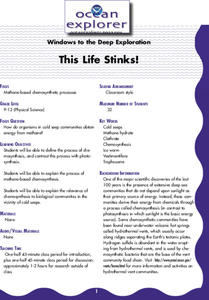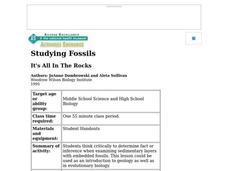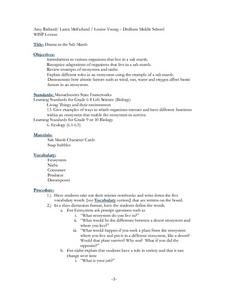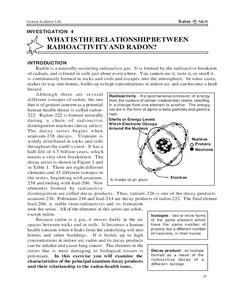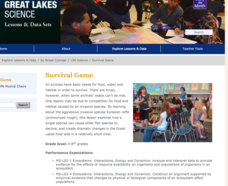Curated OER
How To Use Hardy-Weinberg to Find Gene Frequencies in s Wild Population
Pupils explore the gene frequency in Hardy-Weinberg Equilibrium experiments. They inquire into the studies of both black and gray squirrels. Basically the population genetics of certain squirrel populations. The species of each are...
Curated OER
Hardy-Weinberg Equilibrium According to Hoyle:
Learners gain a feeling for the significance of the Hardy-Weinberg Equilibrium without using algebra but participating in an interactice game.
Curated OER
Pheed the World: Edible Phyla
Students discuss the contributions of different organisms to our world. In this biology lesson, students research countries with limited food supply. They create an improvement plan for a fictitious country assigned to them.
Curated OER
AN EMBRYOLOGY PLACE MAT
Students create a place mat to attain the following objectives: determine the important ideas, concepts, and definitions relating to a list of embryological terms. Match the terms with their definitions and create short quizzes for them.
Curated OER
Extraction of DNA from White Onion
Students conduct lab test with minced onion to determine where chromosonal DNA is located within the cell, and whether or not it can be extracted.
Curated OER
This Life Stinks!
High schoolers explore the process of chemosynthesis and contrast this process with photosynthesis. They consider the relevance of chemosynthesis to biological communities in the vicinity of cold seeps.
Curated OER
Insects Are Helpful!
Students see that insects do lots good and are very valuable to humans and nature. This is part of an ongoing effort to dispel fears of insects. They rotate through a series of centers that have examples of how insects contribute to our...
Curated OER
Making Connections: Exploring Our Brains through the Five Senses
Students record observations and create drawings and models of anatomy using their five senses. They describe the structures of a neuron and analyze each of their functions. They compare and contrast the typical structural features of a...
Curated OER
It's All in the Rocks
Students think critically to determine fact or inference when examining sedimentary layers with embedded fossils. They are being introduced to geology as well as evolutionary biology.
Curated OER
And Just How DO You Kill A Weed?
Students explain chemical, cultural and biological weed control methods. They design and conduct an experiment to simulate a weed control method and explore various ways to prevent weed dispersal.
Curated OER
Drama in the Salt Marsh
Students are introduced to the various organisms that live in a salt marsh. They recognize adaptations of organisms that live in the salt marsh. Pupils review concepts of the ecosystem and niche. Students explain the different roles...
Curated OER
Gallery Walk Questions about Energy and Material Cycles
Students state the physical, chemical or biological processes associated with these environments: Pelagic ocean zone, California coat Cave, Indiana Barrier island beach, North Carolina Sand dune, Dunes National Park, Colorado Wetland and...
Curated OER
Terrific Tastebuds
Young scholars investigate the four taste regions of the tongue. In this biology lesson, students view a diagram of a tongue and identify the four regions. Young scholars perform a taste test with lemons, sugar, and crackers.
Curated OER
Honesty and Ethics in the Science Lab
Learners complete a variety of lab and discussion activities as they are introduced to ethics and honest lab practices. They perform various biology, chemistry, or physics labs which test their ethical lab practices.
Curated OER
Wild, Wild Wetland Wildlife
Students investigate biology by participating in a science experiment. In this dissection lesson, students conduct a nature field trip around their school grounds and identify animals, plants, tracks and waste. Students dissect an owl...
Curated OER
Alien Invaders: An Invasive Species Game
Students are introduced to invasive species and how they affect the ecosystems they now occur in. They explore the basic life histories of several invasive species that are of regional and or national importance. Pupils investigate how...
Curated OER
Science Lessons for Grade 7
Seventh graders construct a food chain based on pictures shown on the board. For this biology lesson, 7th graders describe the motion of particles as energy is changed. They explain how pH changes during neutralization.
Curated OER
Asexual versus Sexual Reproduction
Students explore reproduction. They research organisms and groups of organisms to determine whether they reproduce sexually or asexually. In addition, they determine the organism's habitat.
Curated OER
Biodiversity in an Estuary
Students investigate the biodiversity in estuaries. In this estuary lesson plan, students use Google Earth to explore the Rookery Bay National Estuarine Research Reserve. They produce a biodiversity concept map and portray the life of a...
Curated OER
Identifying Mammals
Students investigate mammals. In this biology lesson, students use various websites to investigate mammals and their body parts. Students take notes the websites.
Curated OER
What is the Relationship Between Radioactivity and Radon?
In this radon and radioactivity worksheet, students analyze the data of the isotopes of elements that occur in the decay series of uranium-238. Students answer 6 questions about the isotopes, their half-lives, their potential threat and...
Michigan Sea Grant
Survival Game
Musical chairs may be a classic game, but Ruffe Musical Chairs is a unique lesson on invasive species! Using the time-honored game, pupils role play the behaviors of the invasive fish called Eurasian ruffe. Learning about this aggressive...
Curated OER
Family Pedigrees
Students work as a class to first construct a pedigree of a popular singer, showcasing the singing gene being passed down through the generations. Students then make their own family pedigree and follow two traits through their family...
Curated OER
Classification: Dichotomous Key
Students explain the classification process of organisms. In this biology lesson, students practice writing the names of organisms scientifically. They answer the dichotomous key and discuss answers as a class.







